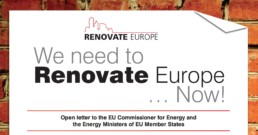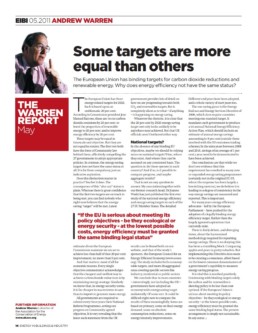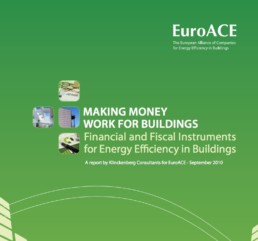Feckless Commission fails to deliver on energy efficiency
Industry leaders of some of Europe's most important companies and organisations today slammed the European Commission's absence of courage on buildings efficiency and other energy efficiency improvements on the energy end-use side. The criticism comes as the European Commission releases its proposal for a framework Directive on Energy Efficiency.
The proposal adopted today by the European Commission clearly falls short of addressing Europe’s daunting climate and energy challenges. According to the International Energy Agency (IEA), 2010 was the worst year in history in terms of CO2 emissions, moving the world closer to the point of no return on global warming.
Speaking last week at a UN High-Level Global Sustainability Panel in Helsinki, Climate Commissioner Hedegaard said "by 2016 we'll have 600bn in fossil fuel subsidies. Think what we could do if we invested this in renewables & efficiency". Strong though they are, the Commissioner’s words were not turned into meaningful actions by the rest of the European Commission. As Europe goes through hard economic times, it is justifiable to question the EU’s obsession with subsidizing the use of foreign fossil fuels and prioritizing the building out of energy supply and transmission when investing in the deep renovation of Europe’s building stock could create 2 million local jobs and increase Europe’s energy security.
“We were shocked by the lack of ambition in the Commission’s proposal” says Rick Wilberforce, President of EuroACE. “Europe is already walking on thin, melting ice, yet the European Commission proposes a Directive that experts already consider as a failure. Even the 3% binding renovation target for public buildings was watered-down, the Commission only opting to renovate buildings to minimum standards instead of deep renovation will lead to a significant untapped savings potential whilst at the same time lead to higher costs for public authorities in the future” he added.
Buildings account for 40% of EU energy demand, and applying existing technologies would already allow saving 83% of total energy demand in buildings. It is already estimated that by 2050, a 3% yearly deep renovation rate of Europe’s building stock, would save 32% of the total primary energy used in Europe. These measures are necessary if the EU is going to have a chance of meeting its 2050 CO2 emissions reduction target.
The Energy Efficiency Directive brought hopes for groundbreaking energy efficiency policy in Europe; however the Commission managed to disappoint the expectations of people and stakeholders, only to satisfy reluctant Member States who although talk up their green credentials lack the ambition to set a clear vision of how our societies will deal with tomorrow’s energy and climate challenge.
Open letter to the EU Commissioner for Energy and the Energy Ministers of the European
Dear Commissioner Oettinger, Dear Ministers,
Recent environmental disasters as well as turmoil in the energy market have underlined the energy challenges that we face. We need affordable, secure and safe energy for our economies to grow and for our citizens to prosper.
You have the opportunity to help address this once in a generation challenge. You can continue the policies of the past or pursue a better, brighter energy future by making Europe’s buildings more energy efficient.
A deep renovation of Europe’s existing buildings will save 32% of the total primary energy used in Europe. This saving is equivalent to the combined total energy production of the European coal and nuclear energy sectors or a saving of 4 billion barrels of foreign oil per year.1
Our companies and trade associations stand ready and willing to help you Renovate Europe. Working together we can create local jobs, reduce Europe’s CO2 footprint and ensure that we are less likely to suffer from foreign energy shocks.
We urge you to ensure that energy saving is made a national and European priority. You can make a start by ensuring that energy saving is given equal weight to energy production in Europe’s 2050 Energy Road Map.
Yours faithfully,
Marc Jardinier, CEO, Aereco • Jean-François Heris, CEO, AGC Glass Europe • Bruno Lacroix, Chairman & CEO, ALDES • Philippe Delpech, President, Carrier EMEA • Richard Pemberton, Chief Executive Officer, Celotex Ltd • Niels B. Christiansen, CEO, Danfoss A/S • Nils Borg, Executive Director, ECEEE • Steve Winslet, Managing Director, EcoTherm Insulation (UK) Ltd • Jan te Bos, Director General, Eurima • Rick Wilberforce, President, EuroACE Monica Frassoni, President, European Alliance to Save Energy • Jan Denneman, President, European Lamp Companies’ Federation • Bertrand Cazes, Secretary General, Glass for Europe • Luc Theis, Group Vice President, Guardian Industries Corp. • Edwin Pittomvils, Vice President and General Manager Europe & North Africa, Honeywell Building Solutions • Nick Webster, Vice President, Huntsman Polyurethanes Europe • Agostino Renna, Vice President and General Manager EMEA, Energy Solutions, Johnson Controls • Gene Murtagh, CEO, Kingspan Group • Tony Robson, Group CEO, Knauf Insulation Philip M. Ramsey, VP Technology – Building Products R&D, NSG Group • Väinö Tuomisalo, CEO, Paroc Group • Garrett Forde, Chief Executive Officer, Philips Lighting Solutions, EMEA • Oliver Loebel, Secretary General, PU Europe • Olivier Chapelle, CEO, Recticel nv/sa • Jakob Sørensen, Senior Vice President, Group Corporate Affairs, Rockwool International A/S • Jean-Pierre Floris, CEO, Saint-Gobain Glass • Benoît Carpentier, CEO, Saint-Gobain Insulation • D. Michael Donnelly, President & General Manager - Performance Films, Solutia Inc. • Jørgen Tang-Jensen, CEO, VELUX Group • Leif Frilund, President and CEO, Walki Group
Some targets are more equal than others
The European Union has binding targets for carbon dioxide reductions and renewable energy. Why does energy efficiency not have the same status?
The European Union has three energy-related targets for 2020. Each is based upon an emblematic 20 per cent. According to Commission president Jose Manuel Barroso, these are: to cut carbon dioxide emissions by 20 per cent; to boost the proportion of renewable energy to 20 per cent; and to improve energy efficiency by 20 per cent.
CEOs Slam Lack of Political Will on Energy Efficiency as Part of New ‘Renovate Europe’ Campaign
Industry leaders of some of Europe’s leading companies and organisations published last week an open letter to EU Member State energy ministers urging them to refocus Europe’s energy policy on promoting the energy efficiency of buildings.
Europe’s energy ministers meet today in Budapest, Hungary, to discuss Europe’s energy strategy to 2050. The letter, which is being published in Le Monde (FR), Financial Times (UK), Berlinske (DK), Handelsblatt (DE), and the European Voice (EU) warns that any effective European energy policy should give reducing energy demand as much political weight as ensuring energy supply.
Despite environmental disasters as well as turmoil in the energy market, recent weeks have seen European governments seek to water down attempts to propose ambitious Europe wide measures that promote the energy efficiency of buildings. For example, European governments have sought to push back on a suggested requirement on governments to renovate 3% of public buildings each year. Governments across Europe are already expected to fail to meet previously agreed targets for achieving energy efficiency improvements by 2020.
“Energy efficiency is the silver bullet to our energy challenges that governments seem unwilling to fire.” said Tony Robson, CEO of Knauf Insulation and one of the signatories of the letter. “The deep renovation of our buildings will reduce our exposure to foreign energy shocks, combat climate change and create 2 million new jobs. It is a political no-brainer but so far there has been very little action. This is why we have joined the Renovate Europe Campaign.”
Europe’s buildings consume around a third of its energy, around the same amount of energy produced by the nuclear and coal sectors together. The European Commission estimates that up to 2 million new jobs would be created through the deep renovation of Europe’s existing buildings.
“Energy ministers have a once in a generation opportunity to shape Europe’s future. We can continue to build increasing numbers of power stations and increase our energy imports or we can start to take real action to reduce demand. The costs of inaction are clear to all.” said Jakob Sørensen, Senior Vice President at Rockwool International, a member of Renovate Europe.
RENOVATE EUROPE Campaign slams the EU Council on consistent attempts to water-down critical energy efficiency measure
Industry leaders of some of Europe's leading companies and organizations today criticised the EU Council over repeated attempts to water-down effective energy efficiency measures. The criticism comes as the EU Council's energy working party gathers to discuss the draft Council conclusions on the "Energy Efficiency Plan 2011".
The conclusions document published last week showed some heavy back-pedalling from Member States on key energy efficiency measures, especially regarding a requirement for public authorities to refurbish at least 3% of their buildings each year. The draft Council conclusions also hold back on the necessity to speed up improvements on existing buildings.
This is all the more concerning as it blatantly denies public opinion, industry, and environmental groups, who are all overwhelmingly in favour of ambitious energy efficiency measures. A survey published just last week by the European Parliament shows that 80% of EU citizens support mandatory energy savings targets, while organizations who responded to the consultation on the “Energy Roadmap 2050” placed energy efficiency as top priority for further energy policy developments in the EU.
“Energy efficiency is the silver bullet to our energy challenges that governments seem unwilling to fire.” said Tony Robson, CEO of Knauf Insulation and one of the signatories of the letter. “The deep renovation of our buildings will reduce our exposure to foreign energy shocks, combat climate change and create 2 million new jobs. It is a political no-brainer but so far there has been very little action. This is why we have joined the Renovate Europe Campaign.”
Europe’s buildings consume around a third of its energy, around the same amount of energy produced by the nuclear and coal sectors together. The European Commission estimates that up to 2 million new jobs would be created through the deep renovation of Europe’s existing buildings.
“Energy ministers have a once in a generation opportunity to shape Europe’s future. We can continue to build increasing numbers of power stations and increase our energy imports or we can start to take real action to reduce demand. The costs of inaction are clear to all.” said Jakob Sørensen, Senior Vice President at Rockwool International, a member of Renovate Europe.
Making Money Work For Buildings
Well-designed financial and fiscal programmes for energy efficiency improvement projects in buildings have a cost-effectiveness to governments of around €20-25/tonne of carbon emissions mitigated, which is lower than virtually all alternative non-traded carbon abatement measures. That is the conclusion of this research report from EuroACE which looked at over 100 instruments currently in place across the EU representing tens of billions of Euros of investment in energy efficiency.




